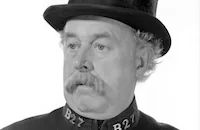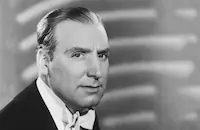Lovers Courageous

Brief Synopsis
Cast & Crew
Robert Z. Leonard
Robert Montgomery
Madge Evans
Roland Young
Frederick Kerr
Reginald Owen
Film Details
Technical Specs

Synopsis
London schoolboy Willie Smith prefers dreaming to working hard at school. Though Willie's stern father John thinks that imagination is useless, Willie's kindhearted mother encourages him to pursue something more exciting than the postal clerk job that John wants for the boy. When Willie grows up, he aspires to be a playwright and travels the world, sending home letters that describe exciting jobs that he doesn't actually have. When he takes a job as a tobacconist's assistant in South Africa, he meets Mary Blayne, the daughter of British Admiral Blayne. Mary is engaged to millionaire Jimmy, her most recent in a string of fiancés, but is bored by the thought of marriage. Because Willie shares Mary's thirst for excitement, she decides to see him again and agrees to be at the London opening of his first play. She also agrees to meet him the next afternoon and hear the love scene he wrote after meeting her. As Mary and Willie's secret romance continues, Jeffrey, Mary's friend and her father's aide, reluctantly tells Mary's parents about the relationship. Though Jeff tells the admiral that Willie seems to be a good person, he advises them to take her back to England to prevent her marrying a man who is only a tobacconist's assistant. The next day, Mary's mother pretends that her sister is gravely ill in England and begs Mary to sail home with her. Mary agrees, but finds it difficult to part with Willie that night. Not wanting Mary to resent his lowly position if they should marry, Willie tells her to think things over, and as her boat sails the next morning, Mary sadly thinks that she has made a mistake by leaving. Back in England, Jimmy greets Mary and wants to set their wedding date. Because she thinks that marriage to Jimmy is inevitable, she agrees, but is miserable and bored at his estate. When Jeff comes to visit her, she learns from him that Willie has left South Africa. Several months later, Willie, who has returned to London to continue writing plays, sends Mary a cigarette case with a note of best wishes. Now knowing that Willie is in London, she goes to the address written on the package and proposes to him. Her father, who has followed her, refuses to give them any wedding money, but promises to take her back if she becomes unhappy. As the months pass, Mary and Willie are still in love, but impoverished, and Mary is forced to sell her car and jewelry to support them while Willie finishes his play. Soon they are so desperate that Willie is reduced to stealing steaks from a butcher. When their landlady tells them that they will be evicted and rebukes Willie for starving his wife, he secretly goes to her father and promises not to see Mary again if the admiral will bring her home. Willie then watches from a distance as Mary leaves with her father. Some time later, Willie barges into the office of actor-manager Gerald Lamone and demands to know what Lamone thinks of his play. Though Lamone's partner thinks the play, called Courage , is unrealistic, Willie changes the man's mind when he reveals that it is his own story. On opening night, Jeff finds Willie and tells him that Mary has been very ill. Willie then rushes to the admiral's house and goes to Mary's room to tell her the truth about the promise he made to her father. She then makes him swear never to go away again. Just then Jeff telephones to say that Willie's play is a tremendous success. Though Willie says that now they can afford to travel the world together, she suggests that instead they stay home and have a baby.

Director

Robert Z. Leonard
Cast

Robert Montgomery

Madge Evans

Roland Young
Frederick Kerr

Reginald Owen
Beryl Mercer
Evelyn Hall

Halliwell Hobbes
Jackie Searl
Norman Phillips Jr.

Alan Mowbray

Eily Malyon
Robert Greig
Crew

Film Details
Technical Specs

Articles
Lovers Courageous -
By Frank Miller

Lovers Courageous -
Quotes
Trivia
Notes
The pre-production title of the film was Courage, and Hollywood Reporter reviewed it under the title William and Mary. The opening title card to the film reads Frederick Lonsdale's Lovers Courageous. Lonsdale is not mentioned elsewhere in the onscreen credits, but Screen Achievements Bulletin credits him with the story and screenplay.














